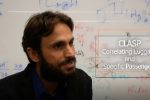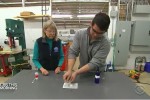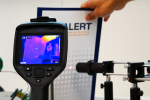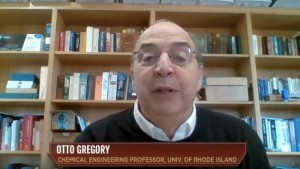News & Events
Video
ALERT Transitions to a DHS S&T Emeritus Center of Excellence December 16, 2021
For users without YouTube access: The ALERT Center Overview
As of spring 2021, ALERT transitioned to become an emeritus Department of Homeland Security (DHS) Science and Technology (S&T) Directorate Center of Excellence.
Since its founding in 2008, ALERT has conducted transformational research, developed technologies, and provided educational development to improve the effective characterization, detection, mitigation and response to explosives-related threats facing the country and the world. Throughout ALERT’s existence, we have worked with strategic partners Northeastern University, Boston University, Purdue University and the University of Rhode Island towards our goals of eliminating illicit explosives, improving on actionable tracing detection, raising the reliability of screening, increasing the accuracy of long distance stand-off discovery of threats and seamlessly transitioning research.
As an Emeritus Center of Excellence, ALERT will continue to conduct research and technology development on several Task Orders and will continue to organize the Advanced Development for Security Applications (ADSA) and the Customs and Border Protection – Advanced Developments Encompassing Processes and Technologies (CBP-ADEPT) workshop series.
In our latest video, ALERT Director Michael Silevitch discusses ALERT’s impact over the years, including but not limited to, the test beds and task orders that have been ushering ALERT technology into the field and into industrial partnerships.
Researcher Highlight: Henry Medeiros on CLASP June 29, 2020

For users without YouTube access: Henry Medeiros on CLASP
The Correlating Luggage and Specific Passengers (CLASP) Task Order is a research initiative to develop technology to automatically track passengers and their divested items at the checkpoint using video analytics. This task order, funded by DHS Science and Technology has brought together research teams from several universities including Boston University, Northeastern University, Rensselaer Polytechnic Institute, and Marquette University.
Henry Medeiros, Assistant Professor of Electrical and Computer Engineering at Marquette University, is working on CLASP research that is specifically focused on creating algorithms that track passengers and their baggage items throughout the entire checkpoint. To develop this technology, Henry’s research team uses machine learning and algorithms developed to identify and detect various scenarios that may occur at a checkpoint.
The ultimate goal of Henry’s research team is to simplify the check-in process with a system that would be able to determine that each passenger is following the required security procedures at airport checkpoints. In our latest ALERT video, Henry discusses his work with CLASP and how this research is changing the airport security landscape.
Meet the ALERT Students April 30, 2020
For users without YouTube access: Meet the ALERT Students
Watch our latest video, Meet the ALERT Students! Hear from Annette Colón Mercado (Project R3-C), Muhammad Usman Ghani (Project R4-C1), and Meng Zheng (Project R4-A3) as they discuss their projects and the importance of ALERT research while participating in the ALERT Industrial Advisory Board Meeting last fall.
The annual Industrial Advisory Board (IAB) Meeting provides students with opportunities to present their work during the student poster session, which allows for networking with industrial members as well as local, state, and federal government representatives. Annette has participated in the IAB meeting for two years and she believes that ALERT research is important to her because, “We are working to make our nation a safer and a more secure place by doing the research we do and by implementing these detection systems for DHS current problems.”
ALERT students are engaged in many events designed to highlight their research accomplishments including the Annual Student Pipeline Industry Roundtable Event (ASPIRE) and the ALERT Technology Showcase.
ASPIRE is held annually each spring at Northeastern University in Boston to support students looking for internships, co-op opportunities and full-time jobs. Students have the opportunity to connect with industrial and government partners through one-on-one meetings to discuss their research, practice “elevator pitches” and discuss employment opportunities
ALERT’s Technology Showcase focuses on the transition of ALERT’s work through presentations, posters, and technology demonstrations of the Center’s research and tools. Students from each project are invited to present their project during the poster session which allows them to connect with faculty, industrial partners, and government representatives throughout the Showcase.
For more information on ALERT projects, please visit the following link: https://alert.northeastern.edu/research/
Department of Homeland Security Centers of Excellence Summit 2019 video now available! March 26, 2020
The Centers of Excellence Summit 2019 was held July 31st – August 1st at George Mason University in Arlington, Virginia. The 2-day Summit included panels with experts, a student poster and innovation showcase, and demonstrations of tools and technology that focused on two topics – Gray Zone Threats and Homeland Security Challenges in a Highly Networked World. Many ALERT team members participated and attended the Summit: ALERT Director, Michael B. Silevitch led a panel discussion on Gray Zone Threats and ALERT students, Emily Belk of Northeastern University and Annette Colón Mercado of UPRM participated in the Student Grand Challenge Competition.
Check out the Summit recap video here!
ALERT Researchers, Dr. Jimmie Oxley and Dr. Otto Gregory featured in the Press December 18, 2019

ALERT Researcher and URI Professor, Dr. Jimmie Oxley, was recently featured on CBS News discussing TSA projects aimed at improving the security screening process for travelers. The story details new technology being developed as part of ALERT research at URI such as the desensitizing agent known as SCHMOO (Safe Control of Hazard Materials or Others Onsite) recently developed by Dr. Oxley’s team. SCHMOO is a unique gel that can be applied to hazardous materials to neutralize them and allow for safe removal and transportation for later analysis.
The CBS article also describes the “digital dog nose” being developed by ALERT Researcher and URI Professor, Otto Gregory with the goal of detecting explosives as well as or better than a bomb-sniffing dog. Dr. Gregory is featured in an additional story on ABC News during with he describes one benefit of the digital dog nose as being available around the clock, thereby not requiring breaks and reinforcement which is necessary for the dogs.
Both news items also describe the “Innovation Checkpoint” at McCarran International Airport in Las Vegas which is a testing space for TSA technologies such as ID readers that will scan licenses to validate identification and flight information without the need to show a boarding pass at the security checkpoint.
Dr. Gregory’s related journal article titled, “Orthogonal Sensors for the Trace Detection of Explosives” appeared in IEEE Sensors in October 2019 and was the subject of a lead story in the IEEE Spectrum.
Watch the full CBS feature story here: https://www.cbsnews.com/news/tsa-testing-advanced-airport-security-technology-digital-dog-nose-innovation-checkpoint/
Watch the full ABC affiliate feature story here: https://youtu.be/LSqfRB5eqwc
ALERT Technology Showcase: Inspiring Innovation October 31, 2019

For users without YouTube access: ALERT Technology Showcase: Inspiring Innovation
This past May, the ALERT Center of Excellence held its first Technology Showcase at Northeastern University. The showcase featured presentations, posters, and technology demonstrations of the Center’s research and tools, highlighting ALERT’s partnerships with industry and government.
In our latest ALERT video, ALERT Technology Showcase: Inspiring Innovation, attendees discuss the importance of bringing researchers from various backgrounds together to share their work and receive diverse viewpoints on their technical approach. Highlighting how this type of a showcase is rare, Astrophysics, Inc. CEO, François Zayek thought it was a great way to encourage researchers to step back from their interests and learn about new technology.
Not only did researchers like ALERT Video Analytics and Signature Analysis Lead, David Castañón, find sharing their work and innovative technologies amongst peers helpful, they also found the exposure to industry and government stakeholders provided a different, yet significant perspective.
“Companies get to see you, and they’re not always available while you’re doing research at a University. It’s good to get feedback from people from different viewpoints in the company and the government. They say, ‘well this is interesting,’ and this may be useful in a context that I hadn’t thought of.”
– David Castañón, ALERT Video Analytics and Signature Analysis Lead and Professor of Electrical and Computer Engineering at Boston University.
Hear more from Professor Castañón and Astrophysics, Inc. CEO François Zayek in “ALERT Technology Showcase: Inspiring Innovation.”
Watch the Newest ALERT Video: “ADSA: Providing Insight and Opportunities to Industry” July 31, 2018
July 31, 2018
The ADSA workshops have always been a place for industry members to meet, collaborate, and realize future goals. In this video, we ask ADSA Industrial attendees about what impact the ADSA workshops have had in fostering the development of new technology and partnerships.
For more information on ALERT Advanced Development for Security Applications (ADSA) Workshops visit: https://alert.northeastern.edu/transitioning-technology/adsa
ALERT Industrial Membership
Whether you are a small business or an industry leader, our ALERT Industry Partner program can provide benefits that bring you closer to the cutting edge research being done that will set your product apart from the competition. Are you interested? Visit our membership FAQ: https://alert.northeastern.edu/industrial-collaboration/f-a-q
This material is based upon work supported by the U.S. Department of Homeland Security, Science and Technology Directorate, Office of University Programs, under Grant Award 2013-ST-061-ED0001. The views and conclusions contained in this document are those of the authors and should not be interpreted as necessarily representing the official policies, either expressed or implied, of the U.S. Department of Homeland Security.
Watch the Newest ALERT Video: “Why ADSA?” May 9, 2018
For users without YouTube access: Why ADSA?
As the ALERT Advanced Development for Security Applications (ADSA) Workshops have evolved over the years, the number and diversity of our attendees has continued to expand. This growth has helped further facilitate collaboration and innovation between various communities, and is one of the definitive qualities that separates ADSA from other professional conferences.
In this video, we ask Department of Homeland Security Science and Technology Directorate Program Managers what they feel is “the most valuable aspect of ADSA” and “why they attend ADSA.”
For more information on the ALERT Advanced Development for Security Applications (ADSA) Workshops, click here.
“ADSA in Three Words” (Video) January 29, 2018
What began as a relatively small workshop (approximately 30 attendees) on the campus of Northeastern University (Boston, MA) in 2009, has evolved into an interactive biannual conference series with over 150 participants regularly. Viewed by participants as a “forum which brings together many different communities with a common goal of solving security challenges,” (ADSA17 participant quote), the ADSA (Advanced Development for Security Applications) Workshop series intends to facilitate collaboration and innovation between these communities.
At the last ADSA workshop (ADSA17 Workshop), ALERT asked several participants to sum up the biannual event in only three words. See what government, industry, and research participants had to say in “ADSA in Three Words.”
For users without YouTube access: ADSA in Three Words
Video: ALERT Undergrads Discuss their Research in Advanced Imaging Technology (AIT) September 27, 2017
ALERT Undergraduate Research in the AIT Lab at Northeastern University
Engineering undergraduates at Northeastern University (Jacob Londa, Daniel Castle, and Nikhil Phatak) describe their work on the ALERT AIT (Advanced Imaging Technology) project, which is led by ALERT Deputy Director, Prof. Carey Rappaport, a faculty member in the Electrical and Computer Engineering department at Northeastern.
Read More
